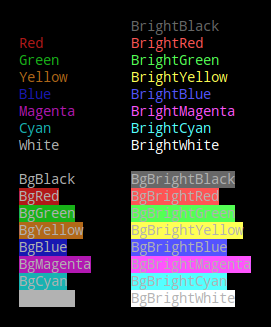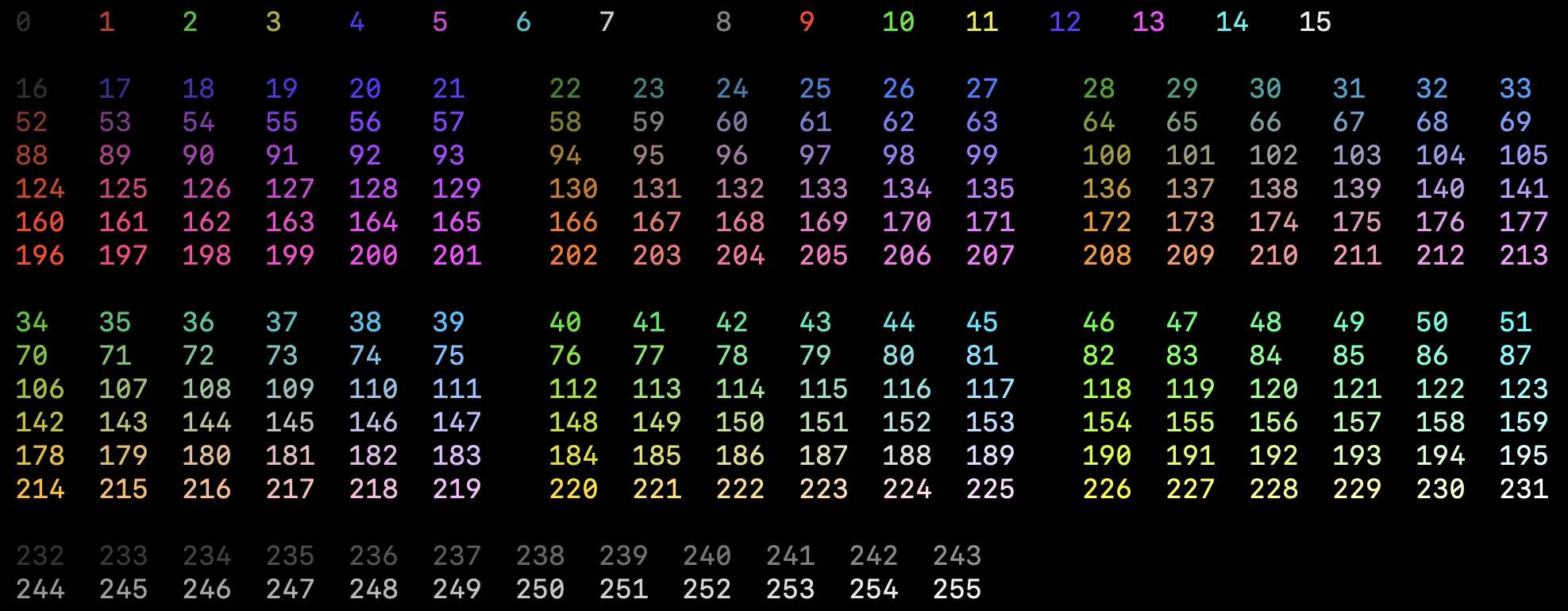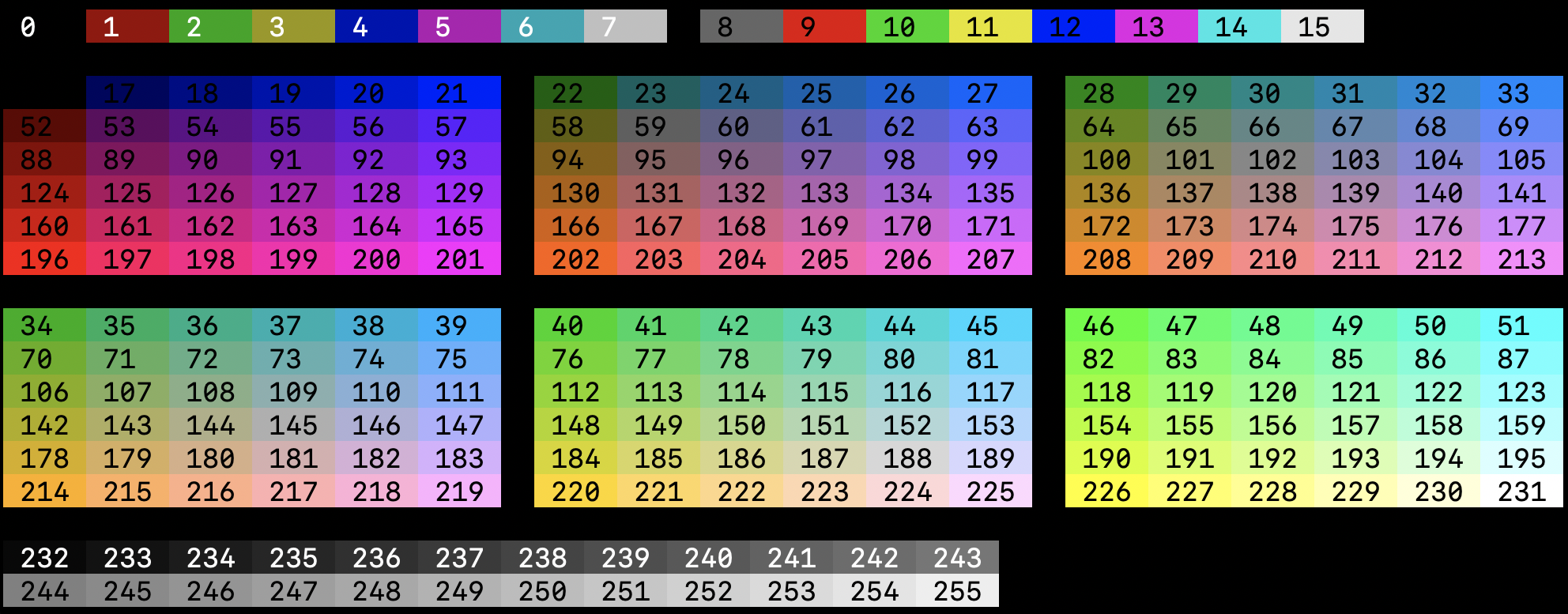Elegant and convenient style definitions using ANSI colors.
Fully compatible and wraps the fmt library for nice terminal layouts.
The following colors are supported to be used by their names for both foreground and background as shown in Example using color names
| Color Name | Color Code |
|---|---|
| Black | 0 |
| Red | 1 |
| Green | 2 |
| Yellow | 3 |
| Blue | 4 |
| Magenta | 5 |
| Cyan | 6 |
| White | 7 |
| BrightBlack | 8 |
| BrightRed | 9 |
| BrightGreen | 10 |
| BrightYellow | 11 |
| BrightBlue | 12 |
| BrightMagenta | 13 |
| BrightCyan | 14 |
| BrightWhite | 15 |
The following palette is supported as foreground/text colors. The numbers represent the color-codes which can be used as shown in Example using color codes.
The following palette is supported as background colors. The numbers represent the color-codes which can be used as shown in Example using color codes.
The following text formats are supported.
- Reset
- Bold
- Dim
- Italic
- Underline
- SlowBlink
- Hidden
- Strikethrough
A go module where you want to integrate go-palette. To create one, follow this guide.
go get github.com/abusomani/go-palette
After installing the go-palette package, we start using it the following way.
A very useful feature of Go’s import statement are aliases. A common use case for import aliases is to provide a shorter alternative to a library’s package name.
In this example, we save ourselves having to type palette everytime we want to call one of the library’s functions, we just use pal instead.
import (
pal "github.com/abusomani/go-palette/palette"
)package main
import (
pal "github.com/abusomani/go-palette/palette"
)
func main() {
p := pal.New()
p.Println("This text is going to be in default color.")
p.SetOptions(pal.WithBackground(pal.Color(pal.BrightYellow)), pal.WithForeground(pal.Black))
p.Println("This text is going to be in black color with a yellow background.")
}Output
package main
import (
pal "github.com/abusomani/go-palette/palette"
)
func main() {
p := pal.New()
p.Println("This text is going to be in default color.")
// We can use color codes from the palette to set as foreground and background colors
p.SetOptions(pal.WithBackground(pal.Color(11)), pal.WithForeground(0))
p.Println("This text is going to be in black color with a yellow background.")
}Output
package main
import (
pal "github.com/abusomani/go-palette/palette"
)
func main() {
p := pal.New(pal.WithSpecialEffects([]pal.Special{pal.Bold}))
p.Println("Bold")
p.SetOptions(pal.WithSpecialEffects([]pal.Special{pal.Dim}))
p.Println("Dim")
p.SetOptions(pal.WithSpecialEffects([]pal.Special{pal.Italic}))
p.Println("Italic")
p.SetOptions(pal.WithSpecialEffects([]pal.Special{pal.Underline}))
p.Println("Underline")
p.SetOptions(pal.WithSpecialEffects([]pal.Special{pal.SlowBlink}))
p.Println("SlowBlink")
p.SetOptions(pal.WithSpecialEffects([]pal.Special{pal.Hidden}))
p.Print("Hidden")
p.SetOptions(pal.WithDefaults())
p.Println("<-Hidden")
p.SetOptions(pal.WithSpecialEffects([]pal.Special{pal.Strikethrough}))
p.Println("Strikethrough")
}Flush resets the Palette options with default values and disables the Palette.
package main
import (
pal "github.com/abusomani/go-palette/palette"
)
func main() {
p := pal.New()
p.Println("This text is going to be in default color.")
// We can use color codes from the palette to set as foreground and background colors
p.SetOptions(pal.WithBackground(pal.BrightMagenta), pal.WithForeground(pal.Black))
p.Println("This text is going to be in black color with a bright magenta background.")
p.Flush()
p.Println("This text is going to be in default color.")
}Output
Go-Palette provides ANSI colors only. Windows does not support ANSI out of the box. To toggle the ANSI color support follow the steps listed in this superuser thread.
Go-Palette provides styled support using ANSI Color codes through escape sequences. This varies between different Terminals based on its setting. Refer ANSI Escape Codes for more details.
Licensed under MIT











